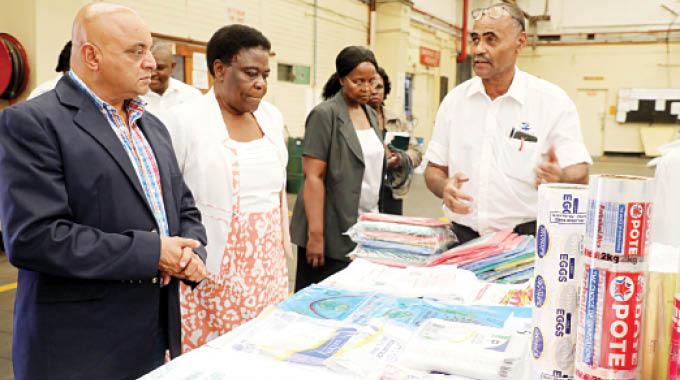Treger Plastics expands operations

Oliver Kazunga, Acting Business Editor
Plasticware manufacturer, Treger Plastics is expanding operations into recycling so that it generates more foreign currency by exporting into the region products manufactured from the recycled material.
Treger Plastics, is a division of the Bulawayo-headquartered Treger Group of Companies.
Briefing Industry and Commerce Deputy Minister Raj Modi after a tour of Treger Plastics’ factory in Bulawayo last week, the company’s group exports director Mr Craig Lowe said his organisation was investing in plastic recycling plants to increase the division’s export earnings.
“As we speak there is four or six huge trucks leaving South Africa going to Harare with equipment to put in wash plants to start washing plastics from the dumps before turning them to pellets, buckets, chairs and selling those to Botswana.
“And that business in Harare, we are generating US$80 000 per month and with the equipment and capital injection all this coming up later in the year, we will ramp up that number,” he said.
“So, we’re continuing to invest more in local content where we can use local materials and local money to turn these into forex that we can tap and keep our markets growing until the situation on the ground improves.”
Mr Lowe said his organisation’s position was to keep going although demand for their products was depressed.
Despite the challenges the company has not retrenched so far.
As a result of the subdued local market, he said, Treger Plastics was operating at 30 percent capacity employing 208 workers while at its peak in recent years, the plastics division employed over 600 workers.
Mr Lowe noted that in 2013 Zimbabwe was going through a boom phase but much of the packaging market was dominated by imports mainly from the Far East.
“We quickly realised that Zimbabwe consumers are the same and there is no way you could offer a sub-standard product, we had to compete with what they (local consumers) were used to getting mainly from the Southern African markets.
“So, we embarked on a R100 million recapitalisation programme and that really hasn’t stopped.”
“We were doing about 120 tonnes a month with old equipment and through recapitalisation in 2014, we brought in new equipment and ramped up production to about 500 tonnes a month without a problem; and that continued to about 2017 when we started to feel depression in the market as our customers mainly in the agriculture sector such as sugar companies and beverages companies started dropping volumes,” he said.
“But at the moment our capacity has gone down to 30 percent and we have been holding firm at that level for a period of about six months and that’s where we are at the moment.”
He said this was because demand locally had dipped and it was not as if they were facing stiff competition from imports as was the case in recent years when the market was full of cheap imported products.
“It’s not as if we are suffering from imports, imports are quite down because if you import you still have to find forex so customers want to buy local, we just have to believe it’s just the demand situation,” said Mr Lowe.
Deputy Minister Modi who was accompanied by the Bulawayo Provincial Minister Judith Ncube, officials from his ministry and the Federation of Master of Printers of Zimbabwe also toured Polyfoil Zimbabwe and Directory Publishers.








Comments